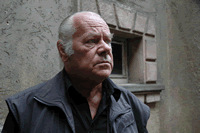Hespos, Hans-Joachim

Biography
Born: March 13, 1938
Country: Emden, Germany
Studies:
Teachers:
Website: http://www.hespos.info/
Born in 1938, hespos has since 1964 composed a huge number of works that are usually extreme even by the standards of the German New Music. Perhaps one of the most remarkable features of hespos' music is that there would seem to have been no discernible process of development of technique or alteration in concerns during the last thirty years. hespos writes as uncompromisingly today as he has always done and the unmediated forcefulness of his work remains almost without parallel even today.
His scores, be they verbal, graphic, more conventionally notated or some combination thereof, always constitute incitements to action rather than instructions to be executed neutrally. Inspired by Adorno and Artaud, each composition forms itself unfettered during the act of composition. Thus each work of any length would hardly be analysable as an artistic object. In hespos' own words, he composes without knowing "whither it goes in the next moment, where it ends".
This radical subjectivity should communicate itself to any audience of hespos' work, his aim being, to quote Artaud "To reach a point at which things must burst if there would be a new departure/beginning ... to lead the spirit to a frenzy, to a rising of its energies".
Such a radical perspective would hardly lead to confinement within accepted artistic genres and notable within many of hespos' works are the often unusual or extreme demands on performance resources. Folk instruments from Eastern Europe often find their way into his ensembles and, in the music-theatre piece Seiltanz (1982), one of the performers has to extricate himself from imprisonment in a metal cage by use of an oxyacetylene welding torch.
The demands placed by hespos on musicians are also extreme and unconventional, not only in terms of the actions required to produce sounds (although in some of his works these obligations are almost impossible to fulfil) but also in that musicians are called upon to co-ordinate their actions mutually and in relation to the full score of the work without the use of a conductor. This stringent reliance on individual responsibility and commitment is extended by hespos even to orchestral scores, the results from which have often been unsatisfying. Indeed, some critics have described hespos' reliance on the good will of performers in realisation of his conceptions as ridiculously Utopian. In a world in which there are perhaps barely a dozen orchestras (all of them being in Germany) that play enough New Music for the musicians not to regard any New Music as somehow alien, whilst political and economic structures encourage if they do not enforce the abdication of individual responsibility for one's actions, it is a brave composer indeed who would subject these social constrictions to an immanent critique by rendering his works vulnerable to them. © Steven Holt 1996 [1]
Works for Percussion
Cang - Cimbalom
HM - Multiple Percussion; Piano (2); Electrician
HOPSzweisätzig - Multiple Percussion; Flute
Monske - Timpani
Padouk - Marimba
Palimpsest - Multiple Percussion; Voice
Psallo Solo - Cimbalom
Santur - Cimbalom
Splash - Multiple Percussion; Double Bass
Tambal - Cimbalom
Tekum - Percussion Sextet
References